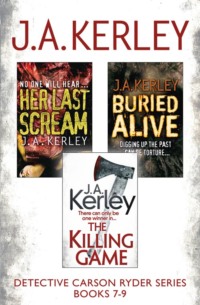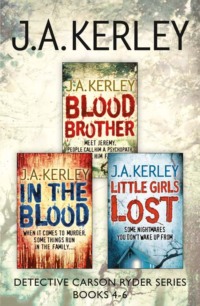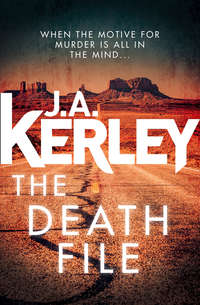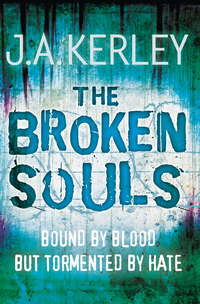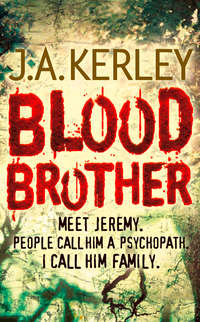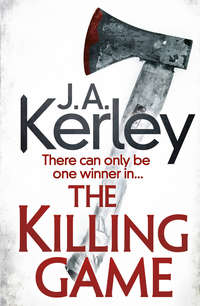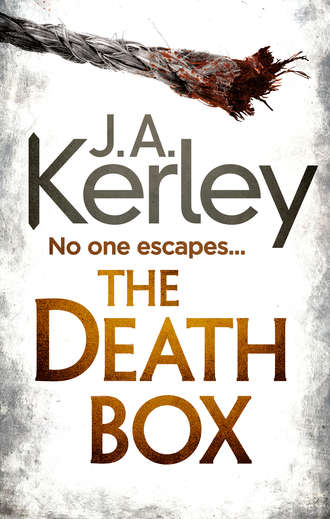
Полная версия
The Death Box



To James Lewinski,
Who showed me Prufrock
Table of Contents
Cover
Title Page
Dedication
Chapter 1
Chapter 2
Chapter 3
Chapter 4
Chapter 5
Chapter 6
Chapter 7
Chapter 8
Chapter 9
Chapter 10
Chapter 11
Chapter 12
Chapter 13
Chapter 14
Chapter 15
Chapter 16
Chapter 17
Chapter 18
Chapter 19
Chapter 20
Chapter 21
Chapter 22
Chapter 23
Chapter 24
Chapter 25
Chapter 26
Chapter 27
Chapter 28
Chapter 29
Chapter 30
Chapter 31
Chapter 32
Chapter 33
Chapter 34
Chapter 35
Chapter 36
Chapter 37
Chapter 38
Chapter 39
Chapter 40
Chapter 41
Chapter 42
Chapter 43
Chapter 44
Chapter 45
Chapter 46
Chapter 47
Chapter 48
Chapter 49
Chapter 50
Chapter 51
Chapter 52
Acknowledgements
About the Author
Also by J.A. Kerley
Copyright
About the Publisher
1
The stench of rotting flesh filled the box like black fog. Death surrounded Amili Zelaya, the floor a patchwork of clothing bearing the decomposing bodies of seventeen human beings. Amili was alive, barely, staring into the shadowed dark of a shipping container the size of a semi-trailer. Besides the reek of death, there was bone-deep heat and graveyard silence save for waves breaking against a hull far below.
You’re lucky, the smiling man in Honduras had said before closing the door, ten days and you’ll be in Los Estados Unitos, the United States, think of that. Amili had thought of it, grinning at Lucia Belen in the last flash of sunlight before the box slammed shut. They’d crouched in the dark thinking their luck was boundless: They were going to America.
“Lucia,” Amili rasped. “Please don’t leave me now.”
Lucia’s hand lay motionless in Amili’s fingers. Then, for the span of a second, the fingers twitched. “Fight for life, Lucia,” Amili whispered, her parched tongue so swollen it barely moved. Lucia was from Amili’s village. They’d grown up together – born in the same week eighteen years ago – ragged but happy. Only when fragments of the outside world intruded did they realize the desperate poverty strangling everyone in the village.
“Fight for life,” Amili repeated, drifting into unconsciousness. Sometime later Amili’s mind registered the deep notes of ship horns. The roar and rattle of machinery. Something had changed.
“The ship has stopped, Lucia,” Amili rasped, holes from popped rivets allowing light to outline the inside of the module, one of thousands on the deck of the container ship bound for Miami, Florida. The illegal human cargo had been repeatedly warned to stay quiet through the journey.
If you reveal yourselves you will be thrown in a gringo prison, raped, beaten … men, women, children, it makes no difference. Never make a sound, understand?
Eventually they’d feel the ship stop and the box would be offloaded and driven to a hidden location where they’d receive papers, work assignments, places to live. They had only to perform six months of house-keeping, yard work or light factory labor to relieve the debt of their travel. After that, they owned their lives. A dream beyond belief.
“It must be Miami, Lucia,” Amili said. “Stay with me.”
But their drinking water had leaked away early in the voyage, a split opening in the side of the huge plastic drum, water washing across the floor of the container, pouring out through the seams. No one worried much about the loss, fearing only that escaping liquid would attract attention and they’d be put in chains to await prison. The ship had been traveling through fierce storms, rainwater dripping into the module from above like a dozen mountain springs. Water was everywhere.
This had been many days back. Before the ship had lumbered into searing summer heat. The rusty water in the bottom of the module was swiftly consumed. For days they ached for water, the inside of the container like an oven. Teresa Maldone prayed until her voice burned away. Pablo Entero drank from the urine pail. Maria Poblana banged on the walls of the box until wrestled to the floor.
She was the first to die.
Amili Zelaya had initially claimed a sitting area by a small hole in the container, hoping to peek out and watch for America. An older and larger woman named Postan Rendoza had bullied Amili away, cursing and slapping her to a far corner by the toilet bucket.
But the module was slightly lower in Amili’s square meter of squatting room. Rainwater had pooled in the depressed corner, dampening the underside of Amili’s ragged yellow dress.
When the heat came, Amili’s secret oasis held water even as others tongued the metal floor for the remaining rain. When no one was looking Amili slipped the hem of her dress to her mouth and squeezed life over her tongue, brown, rusty water sullied by sloshings from the toilet bucket, but enough to keep her insides from shriveling.
Postan Rendoza’s bullying had spared Amili’s life. And the life of Lucia, with whom Amili had shared her hidden water.
Rendoza had been the eighth to die.
Three days ago, the hidden cache had disappeared. By then, four were left alive, and by yesterday it was only Amili and Lucia. Amili felt guilt that she had watched the others perish from lack of water. But she had made her decision early, when she saw past tomorrow and tomorrow that water would be a life-and-death problem. Had she shared there would be no one alive in the steaming container: there was barely enough for one, much less two.
It was a hard decision and terrible to keep through screams and moans and prayers, but decisions were Amili’s job: Every morning before leaving for the coffee plantation Amili’s mother would gather five wide-eyed and barefoot children into the main room of their mud-brick home, point at Amili and say, “Amili is the oldest and the one who makes the good decisions.”
A good decision, Amili knew, was for tomorrow, not today. When the foreign dentistas came, it was Amili who cajoled her terrified siblings into getting their teeth fixed and learning how to care for them, so their mouths did not become empty holes. When the drunken, lizard-eyed Federale gave thirteen-year-old Pablo money to walk into the woods, Amili had followed to see the Federale showing Pablo his man thing. Though the man had official power it had been Amili’s decision to throw a big stone at him, the blood pouring from his face as he chased Amili down and beat her until she could not stand.
But he’d been revealed in the village and could never return.
Good decisions, Amili learned, came from the head and not the heart. The heart dealt with the moment. A decision had to be made for tomorrow and the tomorrow after that, all the way to the horizon. It could seem harsh, but decisions made from a soft heart often went wrong. One always had to look at what decisions did for the tomorrows.
Her hardest decision had come one month ago, when Miguel Tolandoro drove into the village in a truck as bright as silver, scattering dust and chickens. His belly was big and heavy and when he held it in his hands and shook it, he told of how much food there was in America. “Everywhere you look,” he told the astonished faces, “there is food.” Tolandoro’s smiling mouth told shining tales about how one brave person could lift a family from the dirt. He had spoken directly to Amili, holding her hands and looking into her eyes.
“You have been learning English, Amili Zelaya. You speak it well. Why?”
“I suppose I am good in school, Señor Tolandoro.”
“I’ve also heard of your prowess with the mathematics and studies in accounting. Perhaps you yearn for another future, no?”
“I have thought that … maybe in a few years. When my family can—”
“Do it today, Amili. Start the flow of munificence to your family. Or do they not need money?”
Amili was frightened of the US, of its distance and strange customs. But her head saw the tomorrows and tomorrows and knew the only escape from barren lives came with money. Amili swallowed hard and told the smiling man she would make the trip.
“I work six months to pay off the travel?”
“You’ll still have much to send home, sweet Amili.”
“What if I am unhappy there?”
“Say the word and you’ll come back to your village.”
“How many times does that happen?”
“I’ve never seen anyone return.”
Amili startled to a tremendous banging. After a distant scream of machines and the rattle of cables the container began to lift. The metal box seemed to sway in the wind and then drop. Another fierce slam from below as the module jolted violently to a standstill. Amili realized the container had been moved to a truck.
“Hang on, Lucia. Soon we’ll be safe and we can—” Amili held her tongue as she heard dockworkers speaking English outside.
“Is this the one, Joleo?”
“Lock it down fast. We’ve got two minutes before Customs comes by this section.”
Amili felt motion and heard the grinding of gears. She drifted into unconsciousness again, awakened by a shiver in the container. The movement had stopped.
“Lucia?”
Amili patted for her friend’s hand, squeezed it. The squeeze returned, almost imperceptible. “Hang on, Lucia. Soon we’ll have the agua. And our freedom.”
Amili heard gringo voices from outside.
“I hate this part, opening the shit-stinking containers. They ought to make the monkeys not eat for a couple days before they get packed up.”
“Come on, Ivy. How about you work instead of complaining?”
“I smell it from fifty feet away. Get ready to herd them to the Quonset hut.”
Light poured into the box, so bright it stole Amili’s vision. She squeezed her eyes shut.
“Okay, monkeys, welcome to the fuckin’ U S of – Jesus … The smell … I think I’m gonna puke. Come here, Joleo … something’s bad wrong.”
“I smelled that in Iraq. It’s death. Orzibel’s on his way. He’ll know what to do.”
Amili tried to move her head from the floor but it weighed a thousand kilos. She put her effort into moving her hand, lifting …
“I saw one move. Back in the corner. Go get it.”
“It stinks to hell in there, Joleo. And I ain’t gonna walk over all those—”
“Pull your shirt over your nose. Get it, dammit.”
Amili felt hands pull her to her feet and tried to turn back to Lucia. “Wait,” she mumbled. “Mi amiga Lucia está vivo.”
“What’s she saying?”
“Who cares? Haul her out before Orzibel gets here.”
“Orzibel’s crazy. He’ll gut us.”
“Christ, Ivy, it ain’t our fault. We just grab ’em off the dock.”
Amili felt herself thrown atop a shoulder. She grabbed at the body below, trying to make the man see that Lucia was still breathing. The effort was too much and the corners of the box began to spin like a top and Amili collapsed toward an enveloping darkness. Just before her senses spun away, ten final words registered in Amili’s fading mind.
“Oh shit, Joleo, my feet just sunk into a body.”
2
One year later
It seemed like my world had flipped over. Standing on the deck of my previous home on Alabama’s Dauphin Island, the dawn sun rose from the left. My new digs on Florida’s Upper Matecumbe Key faced north, the sun rising from the opposite direction. It would take some getting used to.
On Dauphin Island the morning sun lit a rippled green sea broken only by faint outlines of gas rigs on the horizon. Here I looked out on a small half-moon cove ringed with white sand, the turquoise water punctuated by sandy hummocks and small, flat islands coated with greenery. Like most water surrounding the Keys, it was shallow. I could walk out a hundred yards before it reached my belly.
Which seemed a pleasant way to greet the morning. I set my coffee cup on the deck rail and took the steps to the ground, walking two dozen feet of slatted boardwalk to the shoreline. There were no other houses near and if there had been I wouldn’t have seen them, the land around my rented home a subtropical explosion of wide-frond palms strung with vines, gnarly trees dense with leaves and all interspersed with towering stands of bamboo. It resembled a miniature Eden, complete with lime trees, lemons, mangoes and Barbados cherries. After a rain, the moist and scented air seemed like an intoxicant.
At water’s edge I kicked off my moccasins and stepped into the Gulf, bathtub-warm in August. The sand felt delicious against my soles, conforming to my steps, familiar and assuring. I seemed to smell cigar smoke and scanned the dawn-brightening shoreline, spying only two cakewalking herons pecking for baitfish. Neither was puffing a cigar. I put my hands in the pockets of my cargo shorts and splashed through knee-deep water toward the reeded point marking one horn of the crescent cove, revisiting the conversation that had led me so swiftly and surprisingly to Florida.
“Hello, Carson? This is Roy McDermott. Last time we talked, I mentioned changes in the Florida Center for Law Enforcement. We’re creating a team of consulting specialists.”
“Good for you, Roy.”
“Why I’m calling, Carson … We want you on the team.”
“I don’t have a specialty, Roy. I’m just a standard-issue detective.”
“Really? How about that PSIT team you started … specializing in psychopaths and sociopaths and general melt-downs? And all them freaky goddamn cases you guys solved?”
I smelled cigar smoke again. Looking to my right I saw a black man walking toward the shore with a stogie in his lips, five-seven or thereabouts, slender, his face ovoid, with a strong, straight nose beneath heavy eyebrows. His mouth was wide, garnished with a pencil mustache, and suggested how Tupac Shakur would have looked in his mid-sixties, though I doubt Shakur would have gone for a pink guayabera shirt and lime-green shorts. A crisp straw fedora with bright red band floated on the man’s head and languid eyes studied me as if I were a novel form of waterfowl.
“You the one just moved in that yonder house?” he asked.
“Guilty as charged.”
“The realtor tell you two people got killed in there? That the place was owned by a drug dealer, a Nicaraguan with metal teeth?”
The law allowed the confiscation of property employed in criminal enterprises and the place had indeed been the site of two killings, rivals to the drug dealer who had owned the house. The dealer went to prison and the house almost went on the market, but the FCLE was advised to hold it in anticipation of rising home values. And it wouldn’t hurt for time to lapse between the killings and the showings. When I told Roy I was thinking of looking at places in or near the Keys, he’d said, “Gotta great place you can crib while you’re looking, bud. Just don’t get too used to it.”
I nodded at my impromptu morning companion. “I heard about the murders. Didn’t hear about the teeth.”
“Like goddamn fangs. Heard one had a diamond set in it, but I never got close enough to check. You buyin’ the place from the guv’mint? Nasty history, but the house ain’t bad – kinda small for the neighborhood – but a good, big chunk of land. As wild as it was when Poncy Deleon showed up.”
The house itself – on ten-foot pilings to protect against storm surges – wasn’t overwhelming: single story, three bedrooms. But it had broad skylights and a vaulted ceiling in the main room, so it was bright and open. Outside features included a hot tub and decks on two sides. Mr Cigar was right about the land: four untamed acres, like the house was in a tropical park. Plus the property abutted a wildlife sanctuary, a couple hundred swampy acres of flora gone amok. I figured the dealer had picked the place for the wild buffer zone, privacy for all sorts of bad things.
“Afraid I’m just renting,” I said. “It’s too pricy for me.”
A raised eyebrow. “Kinda work you do, mister?”
“In two weeks I start work for the Florida Center for Law Enforcement. I came from Mobile, where I was a cop, a homicide detective.”
A moment of reflection behind the cigar. “So I guess we both made a living from dead bodies.”
“Pardon me?”
“I used to own funeral parlors in Atlanta, started with one, ended up with six. Retired here last year when my wife passed away.”
“I’m sorry.”
“Why? I like it here.”
“I mean about your wife. Was she ill?”
“Healthy as a damn horse. But she was twenny-five years younger’n me an’ only died cuz one a her boyfriends shot her.”
I didn’t know what to say to that so I walked his way, splashing up to shore with my hand outstretched. “Guess we’ll be neighbors, then. At least for a while. Name’s Carson Ryder.”
His palm was mortician-soft but his grip was hard. “Dubois B. Burnside.” He pronounced it Du-boys.
“The B for Burghardt?” I asked, a shot in the dark. William Edward Burghardt DuBois was an American civil-rights leader, author, educator and about a dozen other things who lived from the late 1800s to the sixties. The intellectual influence of W.E.B. DuBois was, and still is, felt widely.
“That would be right,” he said, giving me a closer look.
“You live close by, Mr Burnside?”
He nodded at a line of black mangroves. “Other side of the trees. Daybreak used to find me heading to the mortuary to get working. Now I head out here and watch the birds.” He took another draw, letting blue smoke dribble from pursed lips. “I like this better.”
“Dubois!” bayed a woman’s voice from a distance, sending a half-dozen crows fleeing from a nearby tree. “Du-bois! Where you at? Duuuuuuuu-bois!”
My neighbor winced, pulled low the brim of the hat and started to turn away. “Stop by for a drink some night, Mister Ryder. We can talk about dead bodies. I may even have one you can look at.”
I splashed away, the sun sending shadows of my temporary home out into the water to guide me ashore. I slipped wet feet into my moccasins and jogged the boardwalk to the porch, moving faster when I heard my cell phone chirping from the deck. The call was from Roy McDermott, my new boss.
“Looks like we got a regular Sunshine State welcome for you, Carson. I’m looking at the weirdest damn thing I ever saw. Scariest, too. I know you don’t officially get on the clock for a couple weeks, but I’m pretty sure this can’t wait.”
“What is it you’re looking at, Roy?”
“No one truly knows. Procurement gave you a decent car, I expect?”
“I signed some papers. Haven’t seen a car.”
A sigh. “I’m gonna kick some bureaucratic ass. Whatever you’re driving, how about you pretend it’s the Batmobile and kick on the afterburners. Come help me make sense of what I’m seeing.”
I hurled myself through the shower and pulled on a pair of khakis and a blue oxford shirt, stepping into desert boots and tossing on a blue blazer. My accessorizing was minimal, the Smith & Wesson Airweight in a clip-on holster. On my way out I grabbed a couple Clif Bars for sustenance and headed down the stairs.
The elevated house was its own carport, with room for a dozen vehicles underneath, and my ancient gray pickup looked lonely on all that concrete. I’d bought it years ago, second-hand, the previous owner a science-fiction fan who’d had Darth Vader air-brushed on the hood. After a bit too much bourbon one night, I’d taken a roller and a can of marine-grade paint and painted everything a sedate, if patchy, gray.
The grounds hadn’t been groomed since the dope dealer had ownership, overgrown brush and palmetto fronds grazing the doors as I snaked down the long crushed-shell drive to the electronic gate, eight feet of white steel grate between brick stanchions shaded by towering palms. I panicked until remembering I could open the gate with my phone and dialed the number provided by the realtor.
Phoning a gate, I thought. Welcome to the Third Millennium.
I aimed toward the mainland, an hour away, cruised through Key Largo and across the big bridge. My destination was nearby, a bit shy of Homestead. Roy had said to turn right at a sign saying FUTURE SITE OF PLANTATION POINT, A NEW ADVENTURE IN SHOPPING and head a quarter mile down a gravel road.
“You can’t miss the place,” he’d added. “It’s the only circus tent in miles.”
3
It wasn’t a circus tent in the distance, but it was side-show size, bright white against scrubby land scarred by heavy equipment, three Cat ’dozers and a grader sitting idle beside a house-sized pile of uprooted trees. Plastic-ribboned stakes marked future roads and foundations as the early stages of a construction project.
A Florida Highway Patrol cruiser was slanted across the road, a slab-shouldered trooper leaning on the trunk with arms crossed and black aviators tracking my approach. He snapped from the car like elastic, a hand up in the universal symbol for Halt, and I rolled down my window with driver’s license in hand. “I’m Carson Ryder, here at the request of Captain Roy McDermott.”
The eyes measured the gap between a top dog in the FCLE and a guy driving a battered pickup. He checked a clipboard and hid his surprise at finding my name.
“Cap’n McDermott’s in the tent, Mr Ryder. Please park behind it.”
It felt strange that my only identification was a driver’s license. I’d had my MPD gold for a decade, flashed it hundreds of times. I’d twice handed it away when suspended, twice had it returned. I’d once been holding it in my left hand while my right hand shot a man dead; his gamble, his loss. It felt strange and foreign to not produce my Mobile shield.
You made the right decision, my head said. My heart still wasn’t sure.
I angled five hundred feet down a slender dirt road scraped through the brush, stopping behind the tent, one of those rental jobs used for weddings and whatnot, maybe sixty feet long and forty wide. I was happy to see a portable AC unit pumping air inside. On the far side, beside a house-sized mound of freshly dug earth, were a half-dozen official-looking vehicles including a large black step van which I figured belonged to the Medical Examiner or Forensics department.


